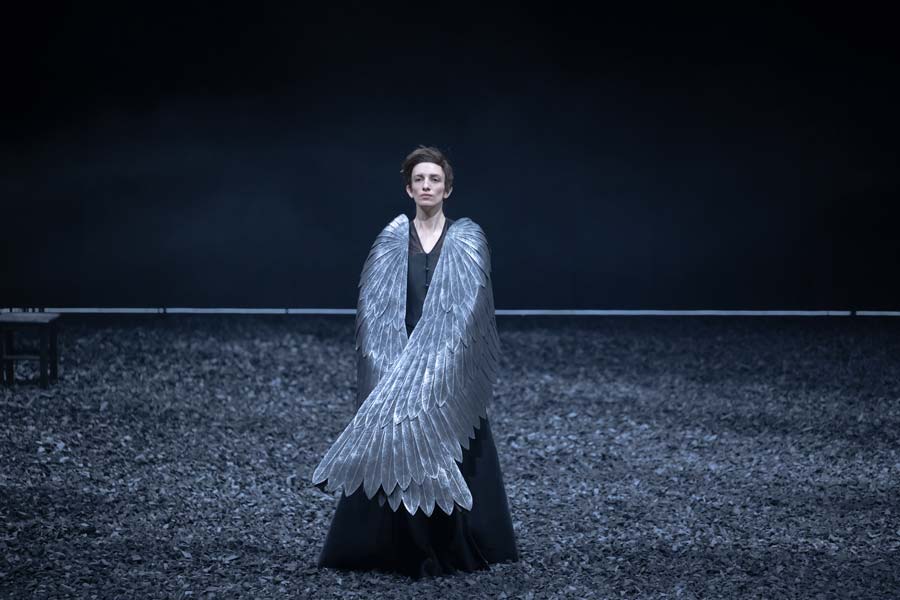
© Julien Benhamou
Le Paradis et la Péri de Schumann à la Seine Musicale
Jacqueline Thuilleux - 14 mai 2025
It was a time when art thrived on transfigurations, spirits, fallen angels, sylphs and supernatural obsessions, redemptive sacrifices of which Wagner’s Parsifal would later become, after the gift of Senta and the burning of the Valkyrie, the most accomplished expression. Good and evil, body and spirit, essential conflicts that are unfortunately sometimes overplayed by the excessive sweetness of certain Romantic poets. So many little flowers under her feet, so many babbling brooks around this delightful Péri, a product of the Persian imagination, which depicted her abundantly in its fine miniatures, and of which Schumann, seduced by the text by Irishman Thomas Moore, Lalla-Rookh, was to make her the heroine of his 1843 oratorio, which was enthusiastically received everywhere. His Scènes de Faust, infinitely darker, would then be performed alongside Berlioz’s Damnation of Faust, which has since been brought out of the pits for stage performance, while La Péri has not yet had this honor.
Trials and encounters
A fine idea, then, in the age of video, even though the auditorium at La Seine Musicale lacks the technical resources to really be an opera house, to project the heroes of this mystical quest onto the stage, with a simple scenography, It’s like leafing through a scrapbook, while a large screen displays luminous images that counterbalance the sadness of the stories told.
An inspired trio presided over this production of Schumann’s UFO, making the work even more compelling: conductor Laurence Equilbey, set designer Daniela Kerck and video artist Astrid Steiner, with sober white and black costumes by Andrea Schmidt-Furterer, who superbly wrapped the angel in black wings that make him look as if he’s stepped out of Notre-Dame de Paris.
Devoid of orientalism
The result is light-hearted, violent at times, and a little creepy when, at the beginning, the characters are constantly picking up bloody cloths, witnesses to the horrors of war. And it appears devoid of orientalism, like Schumann’s music, which only scratches the surface of this theme. But it’s also poetic when it needs to be, with pictorial reminders that instead of returning to Caspar David Friedrich, the usual witness of these romantic ecstasies tending towards union with the cosmos, bring us back to the onirism of a Chirico or even a Delvaux.
Inner strength
Musically, the work, despite some clumsiness in its dramatic handling, is flamboyant, alternating great arias of the most beautiful operatic style, notably for the Péri and the narrator, with choruses of formidable intensity, for example when the people lament at the end of the first part. Once again, the flexibility and rigor of the Accentus chorus is put to the test, with its graduation like the flapping of wings, and its inner strength: as in the scene where, encircling the repentant criminal whose regret will earn Péri her return to Eden, the choristers evoke a tableau worthy of Montségur and its knights of the Grail.
A quality cast
If the sober gesticulations contrasted with the fluidity of the videos, whose delicacy was underlined, the quality of the cast provided nothing but delightful moments, notably with Mandy Fredrich’s Péri, replacing Johanni van Oostrum, who was initially scheduled to perform: her voice was broad, warm and vibrant, becoming more and more moving as she unfolded. We also greatly appreciated the superb clarity and impeccable diction of tenor Sebastian Kohlhepp, as well as the magnificent expressivity of Victoire Bunel in the role of the Angel. The same high standards were applied to the other roles, notably the alto Agata Schmidt, the touching Lancelot Lamotte and Clara Guillon, and the short but noteworthy interventions of Samuel Hasselhorn, in charge of a very special, difficult vocal part, so different in its non-melodic aspect from the lyrical effusions of the other characters
The Insula orchestra responded to the imperious vigor of Laurence Equilbey’s baton, which carried the work in a tumultuous flow. And the listener left shaken by this mystical frenzy, to which Schumann’s music gave its true force, heralding, through the exaltation of sacrificial purity, future delusions less to be recommended. Architectures of penumbra, as Boucourechliev wrote.